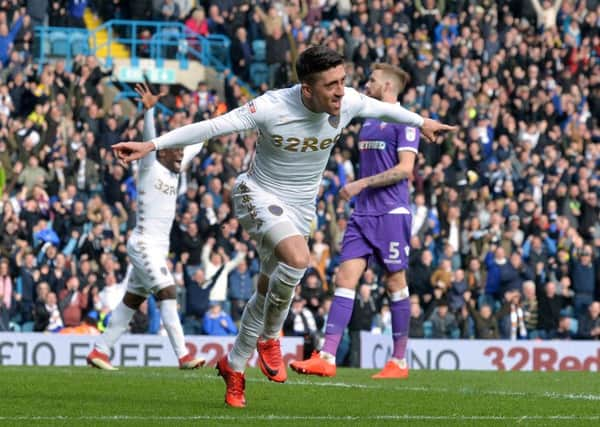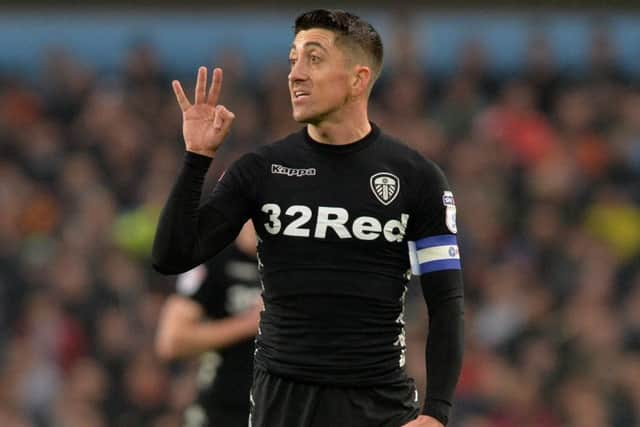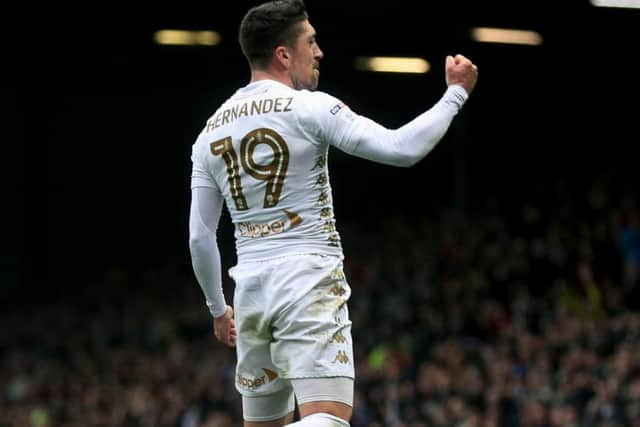Big Interview: Leeds United's YEP Player of the Year Hernandez ... forged in the fires of Castellon


Last year, and without much publicity, Pablo Hernandez bought into CD Castellon, a Spanish fourth division club in the city where he was born.
The takeover – funded by an eclectic group of players, businessmen and a former Valencia director – was altruistic at heart. Castellon were loaded with debt and in danger of going to the wall.
Advertisement
Hide AdAdvertisement
Hide Ad“The club needed people and if we didn’t take control then maybe it would have disappeared,” Hernandez said. “I got into this project because Castellon had big problems. It’s my city, my club; the club where I started. It was important to me to help.”
The investment has not taken long to repay him. This season will end with Castellon, at worst, in the Tercera Division’s play-offs. “I believe we can be promoted,” Hernandez said.
This week he had other things on his mind. A few days ago Hernandez flew back to Spain to be with his wife for the birth to their second son, Luca. Leeds United were happy to excuse him from their last game of the season, tomorrow’s mid-table drill against QPR. But Castellon and Hernandez’s quiet devotion to the city captures his personality. After nomadic tours through Swansea, Leeds, Qatar and Dubai there is still no place like home.
Hernandez grew up in the suburbs of Castellon, the football-mad son of a football-mad father who coached a local boys’ team. Hernandez began playing at the age of four. “The other kids were six or seven,” he said. “That’s the normal age in Spain to start football but my father put me on the pitch. I ran behind the ball and I didn’t care if the other boys ran more than me or didn’t pass to me. I was happy. I only wanted to play. In my life the most important thing was football.”
Advertisement
Hide AdAdvertisement
Hide AdAt 33 his attitude is the same. Hernandez wants his career to give him another two or three seasons – “maybe a maximum of four at a high level” – and he plans to give it up when the enjoyment subsides or when the pace of the sport leaves him behind. “My football has changed,” he said.


“When I started at Valencia, when I was 22, 23, I was very fast and I played as a winger. Now I like playing in the middle with more possession. It’s normal as your body changes. My speed is not the same but I can still run like a young boy. This I always try to show on the pitch. While I can run like that I’ll continue playing. When I can’t, it’s time to stop.”
The odds are in his favour still. Hernandez is named today as the Yorkshire Evening Post’s player of the year and last week he signed a new two-year contract with Leeds, a generous offer for an outfield player of his age. For so long he was prodigious, part of a crop of junior footballers who Valencia invested their faith in. This season he has looked his age, carrying a squad at Elland Road who needed his poise and professionalism. “The time goes fast,” he joked. “My first games at Valencia were 10 years ago. It makes you think.”
Hernandez found his way to Valencia’s academy from Castellon in 2003, before his 18th birthday. He was a rapid, dynamic footballer with ample talent but the standard of competition at Valencia was on a different level. His team-mates included David Silva who he roomed with for a while. Beyond that there was also the history.
Advertisement
Hide AdAdvertisement
Hide AdHernandez had grown up with posters of Gaizka Mendieta on his wall, another Castellon boy who made good at Valencia.


“You talk about Mendieta and for me he was a hero,” Hernandez said. “He’s from Castellon too. When I was a kid I had pictures of him and it was a dream to follow his steps. It was like a miracle.
“In the first days at Valencia I was very nervous. In Castellon it was normal for me to be always one of the best players, an important player. When I arrived at Valencia there were players from all parts of Spain. The academy at Valencia is very good, always very good. There were examples before me and after me. There are examples now.”
Hernandez, at a young age, had imagined turning professional with Castellon. It was what he and his friends talked about. Castellon were once a prominent club, a La Liga side when Hernandez was a boy, but their popularity and success suffered from the presence of nearby Villarreal. “With my father, the first time I watched a professional game was at Castellon’s stadium,” Hernandez said. “All the kids in Castellon, they dreamed to play for the club. But when I went to Valencia, Castellon were playing in the third division. All the money and everything else had gone.”
Advertisement
Hide AdAdvertisement
Hide AdIn time Hernandez broke the academy ceiling at Valencia, albeit a little later than Silva. In subsequent years ‘Pablo 19’ – a reference to his shirt number –was graffitied in reverent fashion on the walls of the club’s training ground. He had been given the chance to take the more fashionable number seven shirt when Joaquin, one of Valencia’s most expensive signings, left for Malaga in 2011.
Out of superstition he stuck with 19. “That is my number,” he told the Spanish media. It continues to be his number at Leeds.
But what made him in Spain was a year at Getafe in 2007-08, under the management of Michael Laudrup. Laudrup would subsequently take him to Swansea City in 2012. “Valencia had big players,” Hernandez said. “I was young and I knew it was necessary to take the step to Getafe to then go back to Valencia and play.”
Laudrup, once of Barcelona and Real Madrid, was respected in Spain. “He was my idol when I was a kid,” Hernandez said, “so it was unbelievable for me to play for him. It’s a great feeling when your coach is your idol. You cannot describe that.”
Advertisement
Hide AdAdvertisement
Hide AdGetafe elevated Hernandez’s reputation both at Valencia and internationally. He won his first cap for Spain in 2009 and has the date – 20.06.09 – tattooed on his right arm below an image of the Virgin Mary. It is that arm which Hernandez kisses first every time he scores. “The date is there so I never forget,” he said. “It was not only for me but for my family. I promised them I would play for Spain. I played in every division to get there.”
Swansea, despite the presence of other Spaniards, was a culture shock; a different climate with a language barrier for a player who had a limited grasp of English. Hernandez understood enough but did not speak it fluently. Nonetheless, by 2012, he and Valencia were outgrowing each other and the call from Laudrup sold Swansea to him.
Hernandez became Swansea’s record signing, at £5.5m. “It was not only about football,” he said. “It was always in my head to play in the Premier League but it was about an experience in life too. I didn’t speak much English but I tried to learn every day. It’s important. Who knows? Maybe I’ll need English in my next job.”
Swansea’s faithful found the midfielder to be enigmatic; never quite delivering as they thought he would. Hernandez said injuries “didn’t give me the opportunity to play my best football” and after Laudrup was sacked in 2014, Hernandez took the singular decision to accept an offer from Al-Arabi, a Qatari club based in Doha.
Advertisement
Hide AdAdvertisement
Hide Ad“It was hard to say no,” he said. “Swansea sacked Laudrup and I didn’t know what they wanted to do with his players. I knew the football in Qatar wasn’t on the level of Spain or the Premier League but the money was good.” Hernandez’s wife and one-year-old son went home instead. “Life in Qatar is not the same as Spain. It’s not easy for a kid so young. So we made that decision.”
His wife, Mar, is the sister of another prominent sportsman, the golfer Sergio Garcia. Garcia has never been to Elland Road but Hernandez plans to invite him next season. “He wants to come and he follows Leeds,” Hernandez said. “He watches some games in America, I think because I’m here. I’m sure in the future he’ll come to a game. He loves football. He plays it well.”
Hernandez is no less partial to golf and has braved occasional rounds with Garcia. “I’m a lucky man to play him sometimes. It’s a pleasure. But when you play with a professional golfer, one like him, you say to yourself: ‘I don’t play golf!’ My golf is like another sport.”
Football, in any case, has Hernandez’s heart and Leeds have held it since he joined them in 2016. He has ideas about what will happen when he retires. “I know when I finish I want to stay in football. Maybe I’ll be a manager or a sporting director.
Advertisement
Hide AdAdvertisement
Hide Ad“In my head I don’t know if I have the best qualities to be a manager but I could start with coaching kids and young players and see if it’s my future.
“There’s Castellon also. I don’t do so much with them now because people with my confidence are working there. My father works in the club too. It’s strange because until now I only knew about being a player. Now I learn about the other parts of a club: the office work, the economic work. Maybe it’s one option in the future, working at Castellon.”
Before then Hernandez would like another crack at the Premier League and it does not seem uncharitable to think that his new contract at Leeds, taking him past 35, is his last chance. “You could say that,” he said. “Many things can happen in football. My target for the next two years is getting this club into the Premier League.
“It’s not easy because the Championship is a hard league with big teams. But I’ll fight for it.”
Fight is all Leeds ever expect.